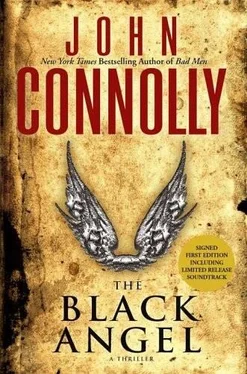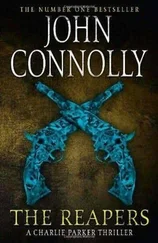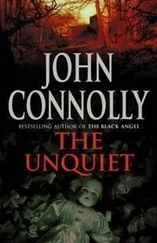One year later, Lilia too was dead, taken by a cancer that her daughter believed was a physical manifestation of pain and grief, and now Sereta was alone. In New York, she had found a kindred spirit in Alice, but that friendship too had been sundered. Alice should have stayed with her, but the grip of the sickness was tight upon her, and she had made her own choice to remain in the big city. Sereta, instead, had headed south. She knew these desert places and how they worked. She wanted those who were pursuing her to think that she had crossed into Mexico. Instead, she planned to skirt the border, making for the West Coast, where she hoped to disappear for a time until she could figure out her next move. She knew that what she had was valuable. After all, she had listened to a man die for it.
Sereta too was watching television, but the volume was down low. She found the glow comforting but did not wish the babble to disturb her thoughts. Money was the problem. Money was always the problem. She had been forced to run so suddenly that there was no time to plan, no time to assemble what few funds she had to her name. She had a friend bring her car to her, then drove away, putting as much space between herself and the city as possible.
She’d heard about the Best Rest in the past. It was a place where nobody asked too many questions and where a girl could make some money quickly, then move on without any further obligation, as long as she paid her cut to the right people. She took a room at the Spyhole, negotiating a pretty good deal, and had nearly two thousand dollars put away after just a few days, thanks in part to a particularly generous tip from a truck driver whose sexual tastes, messy but harmless, she had indulged the night before. Soon she would move along. Maybe just one more night, though, she thought, even as, unbeknownst to her, her existence had already bound itself to the lives of those who had taken her sister.
For far to the north, the Mexican named Garcia might have smiled familiarly at the mention of Josefina’s name, recalling her final moments as he busied himself with the remains of another young woman…
There was only one other person on the motel property. He was a slim young man of Mexican descent, and he was seated behind the reception desk in the office, reading a book. The book was entitled The Devil’s Highway, and it told of the deaths of fourteen Mexicans who had attempted to cross the border illegally not many miles from where the motel lay. The book made the young man angry, even as he felt a sense of relief that his parents had made a good life here and that such a death was not destined to be his.
It was almost 3 A.M., and he was about to lock the door and retire to the back room for some sleep, when he saw the two white men approach the office. He had not heard their car pull up and supposed that they must have deliberately parked some way off. Already he was on his guard, for that made no sense to him. There was a gun beneath the counter, but he had never had cause even to show it. Now that most people paid by credit card, motels provided poor pickings for thieves.
One of the men was tall and dressed in blue. The heels of his cowboy boots clicked upon the tiles as he entered the office. His companion was absurdly corpulent. The clerk, whose name was Ruiz, believed that he had never before seen a man who looked quite so unhealthy, and he had seen many fat Americans in his young life. The fat man’s belly hung so far between his thighs that Ruiz guessed that he must have been obliged to lift it up each time he made water. He carried in his hand a tan straw hat with a white band, and wore a light jacket over a white shirt, and tan pants. His shoes were brown, and polished to a high sheen.
“How you doing tonight?” asked Ruiz.
The thin man answered.
“We’re doing well. You full up?”
“Nah, when we’re full we turn on the NO VACANCIES sign out on the road to save folks a trip.”
“You can do that from here?” asked the thin man. He sounded genuinely interested.
“Sure,” said Ruiz. He pointed to a box upon the wall, lined with switches. Each was carefully labeled with a handwritten sticker. “I just flick a switch.”
“Amazing,” said the thin man.
“Fascinating,” said his colleague, speaking for the first time. Unlike the other man, he did not sound interested. His voice was soft, and slightly higher in pitch than a man’s voice should have been.
“So, would you like a room?” asked Ruiz. He was tired and wanted to get the two men booked in and their cards processed so that he could catch up on his sleep. He also, he realized, wanted to get them out of the office. The fat man smelled peculiar. He hadn’t noticed any stench from the one in blue, but the tubby guy had an unusual body odor. He smelled earthy, and Ruiz involuntarily found himself picturing pale worms breaking through damp clods of dirt and black beetles scurrying for the shelter of stones.
“We may need more than one,” replied Blue.
“Two?”
“How many rooms do you have?”
“Fifteen altogether, but three are occupied.”
“Three guests.”
“Four.”
Ruiz stopped talking. There was something wrong here. Blue was no longer even listening. Instead, he had picked up Ruiz’s book and was looking at the cover.
“Luis Urrea,” he read. “The Devil’s Highway.”
He turned to his companion.
“Look,” he said, displaying the book to him. “Maybe we should buy a copy.”
The fat man glanced at the cover.
“I know the route,” he said drily. “If you want it, just take that one and save some money.”
Ruiz was about to say something when the fat man struck him in the throat, slamming him back against the wall. Ruiz experienced a sense of pain and constriction as small, delicate parts of himself were crushed by the blow. He was having trouble breathing. He tried to form words, but they would not come. He fell against the wall and a second blow came. He slid slowly to the floor. His face was turning dark as he suffocated, his windpipe entirely ruined. Ruiz began to claw at his mouth and throat. He could hear a clicking noise, like the ticking of a clock counting down his final moments. The two men did not appear particularly interested in his sufferings. The fat man walked around the desk, stepping carefully over Ruiz. The dying man again caught the smell of him as he switched on the NO VACANCIES sign out on the highway. His companion, meanwhile, flicked through that night’s guest registration cards.
“One couple in two,” he told the fat man. “One male in three. The name sounds Mexican. One woman in twelve, registered under the name Vera Gooding.”
The fat man didn’t acknowledge him. He was now standing over Ruiz, watching blood and spittle trail from the corners of his mouth.
“I’ll take the couple,” he said. “You take the Mexican.”
He squatted down beside Ruiz. It was a surprisingly graceful movement, like the dipping of a swan’s head. He extended his right hand and brushed the hair from the young man’s brow. There was a mark on the underside of the fat man’s forearm. It looked like a twin-pronged fork, recently burned into the flesh. The fat man turned Ruiz’s head from left to right.
“Do you think we should bring it back for our Mexican friend?” asked Blue. “He works well with bone.”
“Too much trouble,” said the fat man.
His tone was dismissive. The fat man gripped Ruiz’s hair, turning his head slightly, then leaned in close to him. His mouth opened slightly, and Ruiz saw a pink tongue and teeth that tapered to blunt ends. Ruiz’s eyes were bulging, and his face was purple. He spit red fluid, and as he did so the fat man’s lips touched his, his mouth closing entirely upon Ruiz’s, his hand clasping the young man’s face and chin, keeping his jaws apart. The Mexican tried to struggle, but he could not fight both the fat man and the end that was coming. A word flashed in his head, and he thought: Brightwell. What is Brightwell?
Читать дальше












